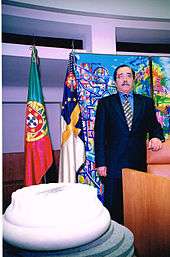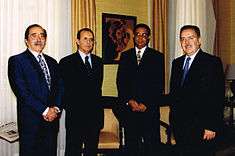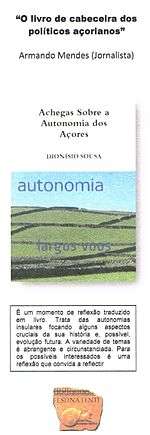Dionísio Mendes de Sousa
| Dionísio Mendes de Sousa | |
|---|---|
 | |
| 7th President of the Legislative Assembly of the Azores | |
|
In office 1995–1996 | |
| Preceded by | Humberto Melo |
| Succeeded by | Humberto Melo |
| Constituency | Azores |
| Personal details | |
| Born |
Dionísio Mendes de Sousa 9 October 1940 Vila de São Sebastião, Angra do Heroísmo (Azores), Portugal |
| Citizenship | Portuguese |
| Nationality | Portuguese |
| Political party | PS |
| Religion | Roman Catholic |
Dionísio Mendes de Sousa[1] (born 9 October 1940) was a professor/teacher, politician, president of the Azorean Regional Assembly and Portuguese writer of the Azores.
Biography
Following his primary instruction, and exam of distinction, Dioníso Mendes studied in the Episcopal Seminary in Angra do Heroísmo from October 1952 to June 1964. In his course work he obtained the highest classifications, around 16 in a scale of 20, in more than half of his disciplines.
Career
Between 1965 and 1968 he was enlisted in mandatory military service, stationed at various military installations, including main army barracks in Lisbon. At the same time he frequented classes at the Faculty of Letters at the University of Lisbon, obtaining the licentiate diploma in Philosophy. By the 1969-70 term, he was exercising a position of history professor in the secondary school Liceu Padre António Vieira in Lisbon, and at the Externato Séneca teaching Portuguese. In 1971, he took frequented the course of Pedagogical Sciences, once again, at the University of Lisbon. Between 1971 and 1974, he was registered and participated in night classes and as working-student at the Instituto Superior de Economia (ISEF), in classes of the Work Sciences program, while he worked as the personal services director at Transul – Empresa de Transportes in the southern Tagus estuary.
During the 1976-1977 school year, he was secondary school professor at the Liceu de Almada in psychology and philosophy, but during the 1977-1978 school term he was teaching intern at the Liceu Antero de Quental, in Ponta Delgada. In the 1978-1979 school year, he returned to Terceira, working at the Liceu de Angra do Heroísmo, becoming the president of the executive council in the 1979-1980 school year.
Politician

During the regional elections of 5 October 1980[2] he became a candidate for the regional legislative assembly as an independent in the lists of the PS Azores.
Between 1980 and 2004, he was a regional deputy during six legislatures, and president of the PS parliamentary group (1981-1992). In various legislatures he was the president of the permanent commission of the regional assembly on social and economic affairs.[3] Between 1982 (when he became a registered member of the Socialist Party) and 2004, he exercised various political/party positions in local, regional and national levels. This included the regional secretariate of the Socialist Party, member of the Regional and National COmmissions of the PS, member of Municipal Assembly of Angra do Heroísmo and president (for eight years) of the PS parliamentary group, candidate for the municipal council of Angra (1989) and President of the PS Azores.
From 1996 to 1998 he was elected President of the Regional Legislative Assembly of the Azores. On 3 September 2001, he was awarded the Grand Cross of the Order of the Infante D. Henrique by former President of the Republic Jorge Sampaio.[4]
From 2002 to 2004 he was president of the Rádio Clube de Angra and, in 2004, obtained his pension for his work as secondary school professor. By unanimity, during a meeting of the regional assembly, on 11 May 2006 Dionísio Mendes was decorated with the Autonomic Insignia of Valor for his contributions to the region.[5]
Writer

Since 1980 Mendes was involved in many of the newspapers and media services in the reigon, including the A União, Diário Insular, Açores Expresso, Correio dos Açores, supporting the Projecto Autonómico de Aristides da Mota (31 March 1892)[6] In 2013, he provided the preface and edited the work Testamento Poético of Coelho de Sousa[7]
On his own, Dionísio Mendes was responsible for Achegas sobre a Autonomia[8] and Livro de Bagatelas,[9] which was later followed on 14 January 2014, by the trimestral publication Boa Nova, the first journal edited in Vila de São Sebastião.
Dionísio was married in 1974, to Maria Doralice Barcelos Falcão Sousa, and eventually had two children: Ana Rita Falcão de Sousa Carapinha (married to Nuno Miguel Morais Carapinha) and José Duarte Falcão de Sousa, born 27 December 1979 and 3 September 1982.
Dioníso was the author of various blogs, including O Ventilhador[10] and Álamo Esguio.[11]
References
- Notes
- ↑ GrãCruz (in Portuguese), retrieved 14 July 2014
- ↑ Resultados das eleições regionais de 1980 (in Portuguese), Comissão Nacional de eleições, retrieved 12 July 2014
- ↑ Presidente da Comissão Permanente de Economia (PDF) (in Portuguese), Diário da Assembleia Regional, retrieved 12 July 2014
- ↑ Atribuição da Grã-Cruz Infante D.Henrique (in Portuguese), Ordens Honoríficas Portuguesas, retrieved 12 July 2012
- ↑ Atribuição da insignia de Valor (PDF), Diário da Assembleia Regional dos Açores, retrieved 12 July 2014
- ↑ Sousa, Dionisio (27 May 2014), Projecto autonómico de Aristides da Mota 31 Março 1892 (in Portuguese), Correio dos Açores
- ↑ Sousa, Coelho (February 2014), Testamento poético
- ↑ Sousa, Dionisio (February 2014), Achegas sobre a Autonomia
- ↑ Sousa, Dionisio (May 2014), Livro de Bagatelas
- ↑ Sousa, Dionisio (February 2005). "O Ventilhador". Retrieved 12 July 2014.
- ↑ Sousa, Dionisio (May 2004). "Álamo Esguio". Retrieved 12 July 2014.